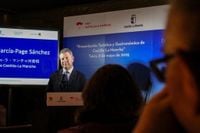On May 8, 2025, Emiliano García-Page, the president of Castilla-La Mancha, showcased the region's rich cultural heritage to attract Japanese tourists during an event in Tokyo. This presentation was part of a broader effort to promote the region at the Expo 2025 in Osaka, where García-Page led a delegation aimed at tapping into the Asian market.
During his address at the TexturA restaurant, García-Page emphasized the significance of Castilla-La Mancha's 2,000 years of European history, which he described as a "window into the last 2,000 years of the life of Europe." He highlighted the cultural contrasts found in the region, particularly among the Christian, Muslim, and Jewish religions, asserting that this diversity is a unique aspect of both Castilla-La Mancha and Spain as a whole.
"The Japanese tourist seeks to consume culture and the contrast of civilizations, not just beaches," García-Page stated, acknowledging the admiration between Spain and Japan, the latter being a custodian of a millenary culture. He pointed out that cities like Toledo and Cuenca, both recognized as UNESCO World Heritage sites, are easily accessible from Madrid, being just 30 minutes away by high-speed train.
García-Page's remarks came during a gathering that included notable figures such as the Spanish ambassador to Japan, Íñigo de Palacio, and the regional tourism advisor, Jaime Alejandre. The event served to strengthen cultural and tourist ties between Castilla-La Mancha and Japan, further promoting the region's culinary traditions.
At the event, renowned chefs from Castilla-La Mancha, including Enrique Pérez from the restaurant El Doncel, showcased the region's gastronomy. This culinary display was part of a broader strategy to highlight the fusion of tradition and innovation in the region's food culture.
García-Page expressed a vision for Spain to become a leading global tourism power, with an emphasis on attracting more Japanese visitors. He noted that there has been an 18 percent increase in Japanese tourists to Castilla-La Mancha over the past year and expressed a desire to double this figure within the next five years.
"We aspire for Spain, particularly Castilla-La Mancha, to be an increasingly preferred tourist destination for the Asian population," García-Page remarked, underlining the potential of the Asian market. He pointed out that this market is not just about sun and beach tourism but about cultural and civilizational experiences.
During a separate event at the Expo 2025, García-Page reiterated his commitment to doubling promotional efforts in the Asian market for both tourism and artisanal/agro-food production. He remarked on the similarities between Spain and Japan, noting that both cultures value heritage and innovation. "We have much to improve in exportation and promotion, and we have a lot to gain in return," he stated.
García-Page also highlighted the importance of tourism as a source of employment, projecting that at least 15,000 new jobs linked to tourism could be created in the next decade. He emphasized that over 50,000 families in Castilla-La Mancha are currently connected to the tourism industry.
In a day filled with activities, García-Page visited the Sumitomo Pavilion, a company recently established in Cuenca, and toured the Castilla-La Mancha exhibits at the Spain Pavilion. He took the opportunity to promote the cultural icon of the region, Don Quijote, which he noted has a significant following in Japan. "The story begins in Toledo," he reminded attendees, linking the classic tale to the rich cultural tapestry of Castilla-La Mancha.
The event in Tokyo was not just about promoting tourism; it was also about fostering relationships and understanding between cultures. García-Page reflected on the role of tourism in promoting peace and coexistence, particularly in a world increasingly marked by radicalism and division. He expressed hope that cultural exchanges could contribute to greater understanding and appreciation among diverse communities.
In conclusion, the efforts to promote Castilla-La Mancha in Japan underscore the region's aspirations to become a key player in the global tourism market. By highlighting its rich history, diverse culture, and culinary excellence, Castilla-La Mancha aims to attract a new wave of tourists eager for authentic experiences.


